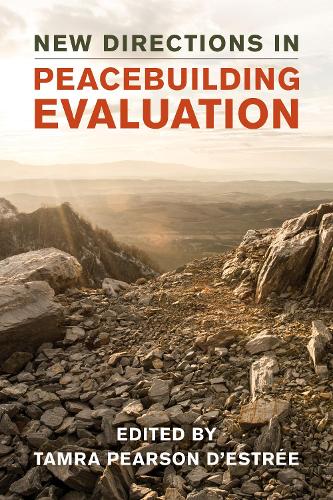
New Directions in Peacebuilding Evaluation
(Hardback)
Available Formats
Publishing Details
New Directions in Peacebuilding Evaluation
By (Author) Tamra Pearson dEstre
Bloomsbury Publishing PLC
Rowman & Littlefield International
11th November 2019
United Kingdom
Classifications
Professional and Scholarly
Non Fiction
Political science and theory
Warfare and defence
303.66
Winner of CHOICE Outstanding Academic Title 2020 2020
Physical Properties
Hardback
258
Width 157mm, Height 232mm, Spine 21mm
535g
Description
In this landmark collection, the voices of pathmakers and innovators in peacebuilding evaluation are assembled to provide new direction for the field. Stock is taken of the development and challenges of engaging in the real-time learning that evaluation requires. Best practices for overcoming challenges are discussed and critiqued, as well as some of the basic assumptions guiding the field. New means of gathering information and understanding conflict processes are offered and examined. To continue to evolve and strengthen peacebuilding practices and professionalism, multiple calls are issued for collaborative learning and a field-wide effort at community inquiry.
Reviews
With this volume, one gets the sense of a discipline coming of age; it articulates a maturing of the field of scholarship around peace-building and conflict engagement/transformation/resolution. The work includes contributions from scholars and practitioners who propose strategies for determining what works, why, and how in a complex field that has often seen itself as exceptional, resisting efforts to set realizable goals for--and implementing processes for achieving--assessment. Anchoring chapters by the editor lay out the groundwork for evaluation (types and purposes) and make a plea for building a "community of inquiry for public, shared, and cumulative learning." Other contributions review the different contexts and modalities for evaluation, and different evaluative tools and frameworks applicable in these contexts--all in the interest of building knowledge from experience. Overall, the work contributes to clarity--conceptually and operationally--for an emerging field that is starting to look at itself, and indicates ways the field can build both problem-solving and theory-building research. It will be of interest to practitioners and scholars, as well as to students of social science methodology. Summing Up: Recommended. Upper-division undergraduates through faculty and professionals.
Author Bio
Tamra Pearson dEstre is Henry R. Luce Professor of Conflict Resolution in the Josef Korbel School of International Studies at the University of Denver and has co-directed DUs Conflict Resolution Institute since 2002.
